Photographs: Rajesh Karkera/Rediff.com Archana Masih in the West Khasi Hills. Meghalaya
"I have 27 missed calls during the time I've been speaking to you! Here if you don't answer the phone, there is every chance a party member will tell you 'Because you didn't answer my phone I'm leaving your party'."
Rediff.com's Archana Masih reports on how a graduate of the prestigious Wharton Business School fits into the unusual landscape of North-East politics.
Photographs: Rajesh Karkera
In the firmly entrenched tradition of India's dynastic politics, Conrad Sangma's entry began with failure. He lost his first by-election in 2004 by 182 votes which made Sangma junior realise early on in his fledgling career that his father, Purno Aitok Sangma, may have been MP for 30 years, but it needed more than his father's name to win people's vote.
"If you are depending on your family background, I don't think it's going to be sustainable. It will go off one day and you will fail and I failed the first time itself," says Conrad, 35, the Leader of the Opposition in the outgoing state assembly in Meghalaya, the hill state in the North-east going to the polls on February 23.
"It can give you access and entry advantage, but you can't depend only on that. Ultimately it is about connecting with the people, responding to them, understanding their aspirations. It's not whether you can solve all their problems, but letting them know that you are going to make the effort."
Conrad won an election on his second attempt in 2008, and after spending one year in the ruling coalition and four years in the Opposition, confronts the fresh challenge of seeking votes after merging into the National People's Party six months ago.
"It has been a short, but difficult, time for me. I've been baptised by fire. It's been tough, but wonderful. If I was a KG student when I began, I think I'm a matric pass now," he laughs, sitting in a van that has been converted into a poll vehicle, painted with the party symbol from outside and fitted with comfortable sofas, television, microwave, toilet etc inside.
Please ...
The Sangmas' stronghold is the Garo Hills
Image: Women take a look into the unsual campaign van in the state.Photographs: Rajesh Karkera/Rediff.com
When the van stops outside the home of the party candidate contesting from Mawkyrwat in the West Khasi Hills, curious women climb into the van to have a look, giggling as they take their photos on mobile phones.
For the last few weeks, the three Sangma siblings who are in politics -- Agatha, the MP from Tura and a Union minister till her father decided to contest the Presidential election against Pranab Mukherjee; James, an MLA from Ronchugiri; Conrad, the MLA from Selsella -- along with their father P A Sangma, have been campaigning hard for the 33 seats they are contesting in the 60-member assembly.
The Sangmas, arguably the most prominent political family in the North-east, split from the Nationalist Congress Party and merged with the NPP after the NCP refused to support P A Sangma in his bid to become President of India.
The family stronghold remains the Garo Hills from where the NCP won 13 of its 24 seats in the last assembly election. Tura, the other Lok Sabha constituency apart from Shillong in the state, has not been represented by the Sangmas on only two occasions -- P A Sangma has won the seat eight times, while his daughter Agatha, the current MP, has won it twice.
In a state where politics is largely personality driven and where tribes often vote collectively, Meghalaya has had history of political turbulence.
Four different coalition governments have governed the state in the last five years and another hung assembly seems a certainty.
There are so many disgruntled ticket seekers, going solo after being denied party tickets that the number of Independents has soared to a record high.
Since the size of the assembly constituencies are small, personal connectivity with the voters is crucial to winning an election here.
Please ...
'It is a tough and a very important election for us'
Image: A Khasi woman carries her child on her back at the poll meeting.Photographs: Rajesh Karkera/Rediff.com
The P A Sangma factor continues to be an important factor in state politics, especially in the Garo Hills, but the fact that the family is fighting under a new symbol poses a fresh challenge.
The outcome of this election will not only determine P A Sangma's continuing relevance in Meghalaya, but also in national politics.
"No doubt, it is a tough and a very important election for us. We've prepared very hard," says Conrad Sangma, P A Sangma's eldest child, who studied at New Delhi's St Columbus School and the Wharton Business School.
"Politics is a fluid situation. It is not as if this is a final test but yes, it is an important test for us. It's important for us to perform and send a message to the region and the country that Mr P A Sangma has still got his hold and the move from the NCP to NPP didn't matter."
He feels the NPP will fare better in its debut in the state and will be in a position to form the next government with like-minded parties like the Bharatiya Janata Party with whom the NPP is aligned in the National Democratic Alliance.
"Being in a coalition is a political alignment -- that doesn't mean that we agree on every aspect of their political ideology."
Please ...
Music is an important part of this election
Image: A local musician sings a Khasi song at Conrad Sangma's campaign meeting.Photographs: Rajesh Karkera/Rediff.com
In the open ground in Mawkyurwat, a freshly created district, which is seen by the NPP as a ploy by the Congress to get votes, a young boy is strumming the guitar and singing a poll song in Khasi.
The crowd bursts into laughter at some points listening to his lyrics as he stands on stage surrounded by local leaders, all of whom make speeches longer than Conrad Sangma.
Music is a vital role in the election -- from CDs urging people to vote, to live performers at campaign meetings -- such is the stress on music that on Valentine's Day the state's chief electoral officer organised a concert to encourage voters to come out in large numbers on polling day.
Conrad, a keen musician himself, says he plays the guitar and the piano whenever he finds the time and among the young politicians he is friendly with is Milind Deora, the MP from South Mumbai, who also has a strong interest in music.
"Milind is a musician. I can also make some noise," he smiles.
After the young boy makes his way off the stage to loud applause from the crowd, most of whom chew kwai, the local betelnut, Conrad finally takes to the stage after speeches from ten people in Khasi.
Having grown up in New Delhi, he had mentioned on his way to the election meeting that earlier his English and Hindi were better than his native Garo, but now he can speak all three languages nearly as well.
He was attempting to learn Khasi, the language of the other Meghalaya tribe, but it was turning out to be hard. So today at the election meeting in a Khasi area, he was going to speak in English and would have a translator.
That thought was quickly discarded when he is told that most in the audience understood English.
Please ...
'The Meghalaya assembly was in session for only 13 days!'
Image: The election campaign meeting at Mawkyrwat, three hours from Shillong.Photographs: Rajesh Karkera/Rediff.com
"The power of an MLA is tremendous. Sadly, most MLAs don't use this power to work for the development of the state," he tells his audience.
"I feel disappointed that MLAs don't participate in the assembly. In 2012-2013, the Meghalaya assembly was in session for only 13 days!"
"Only two sectors have grown in the state -- the foundation stone laying sector and the pandal sector. The Congress government has taken us back to the stone age -- the foundation stone age."
The NPP maintains that the Congress, lead by Chief Minister Mukul Sangma, is busy fighting amongst themselves rather than fighting the NPP and all those who were unable to get election tickets have turned against the leadership.
Pointing out to the policy flaws, especially concerning the high dropout rate in a state where almost 50 per cent of the population is below the age of 15, Conrad Sangma tells Rediff.com that among the 72 colleges in the state, 50 to 60 are concentrated in Shillong, the state capital.
Please ...
'Insurgency needs a multi-pronged approach'
Image: People listen to the many speeches at the meeting in Mawkyrwat, which is a rocky region.Photographs: Rajesh Karkera/Rediff.com
The Garo Hills, which consists of five districts, is also the region where the outlawed Garo National Liberation Army is in an armed struggle for a separate state of Garoland.
The ANVC, the other insurgent group in the area, has recently entered into a ceasefire agreement with the state government, but the GNLA has increased its activity and influence in the Garo Hills.
"We have to look at insurgency from a multi-pronged approach -- social, political, economic. Unless we look at it holistically, we will not be able to solve it. We need to try all channels -- MLAs, church leaders, village elders, locals, NGOs. I feel all efforts are not being made," says Conrad Sangma, stressing on how insurgency has hampered development in the state.
"Tomorrow if we eliminate the GNLA or ANVC or some other group, another group will come up the day after. The problem is at the grassroot level and we have to work on that."
Please ...
'I used to play music, but now I face the music'
Image: Conrad Sangma has been an MLA for one term and is seeking re-election.Photographs: Rajesh Karkera/Rediff.com
For someone who spent time in his childhood sticking posters for his dad whom he refers to as "Mr P A Sangma" in this interview, Conrad remembers travelling in the police car with constables for campaign meetings as a child and giving his first election speech at age 13.
His father's expulsion from the Congress on Sonia Gandhi's foreign origin issue added to the moment of his joining politics.
"I thought it was my duty to help at that time," he says, pointing out that his father has always been a man of principle.
"I don't know what position he would have been had he not left the Congress -- it is difficult to say -- but I know he is a satisfied man overall," he adds.
Patricia Mukhim, the editor of the Shillong Times newspaper and a well known political observer feels that Conrad's future would be brighter if he was part of a party that could make a dent in the political system in Meghalaya. She maintains that the NPP will not win too many seats to be in such a position.
"He is articulate, good in debates, incredibly intelligent, and very politically savvy. Both the brothers have to step out of their father's shadow," Mukhim feels.
But Conrad feels there are merits and demerits of being part of a big party.
"You get lost in a big organisation. You may not even get the chance to meet the leader. I am more cut out for an organisation that responds fast and connects with everybody," says Conrad who could be a strong contender for the chief minister if his nascent party gets a shot at forming the government.
He brushes aside such possibilities, taking on the campaign with gusto for now, and expecting to better the 15 MLA mark of the last election.
The tough campaign schedule and ups-downs of state politics hardly give him any time for playing music, but a few friends still call him a musician-politician.
"To them, I say, I used to play music, but now I face the music."

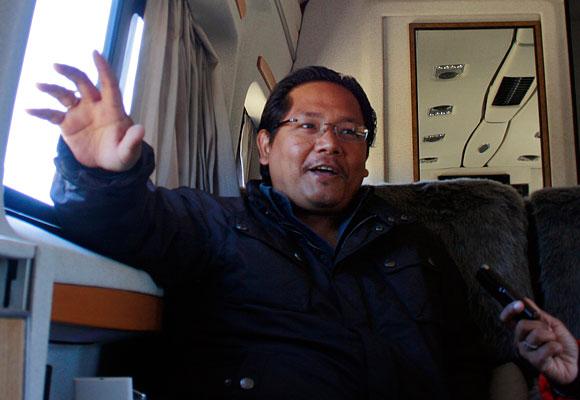
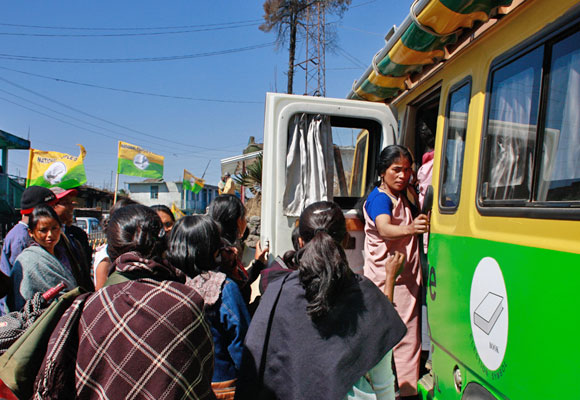
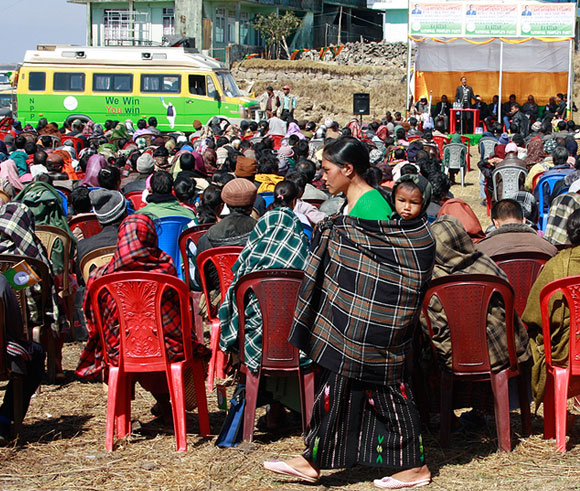
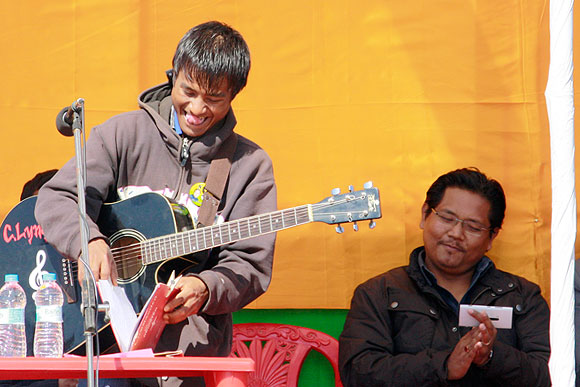
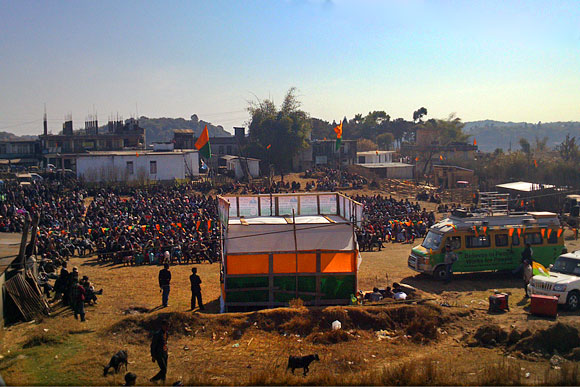
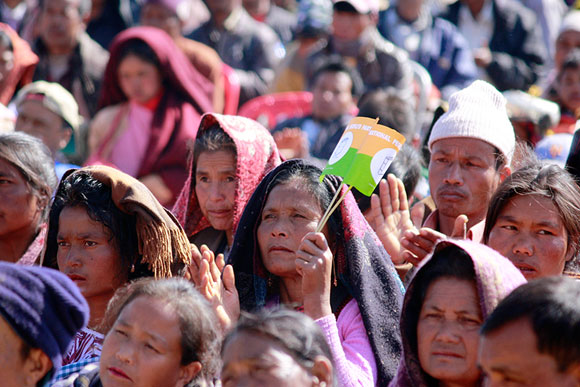

article